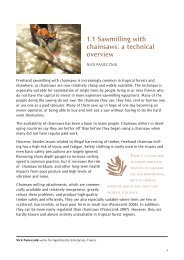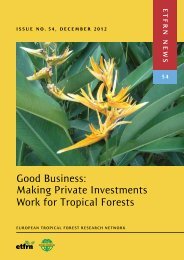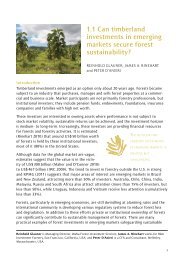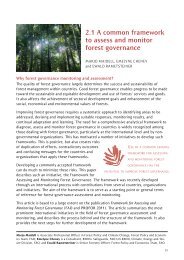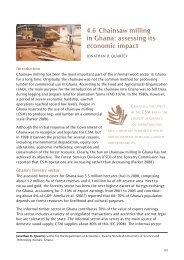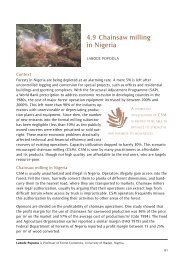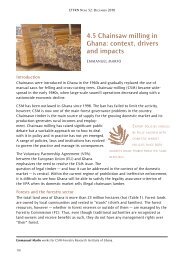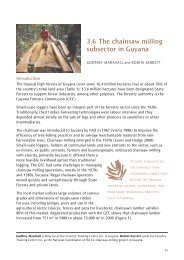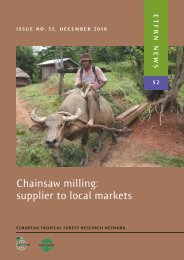Chainsaw milling: supplier to local markets - European Tropical ...
Chainsaw milling: supplier to local markets - European Tropical ...
Chainsaw milling: supplier to local markets - European Tropical ...
Create successful ePaper yourself
Turn your PDF publications into a flip-book with our unique Google optimized e-Paper software.
4.9 chainsaw <strong>milling</strong><br />
in Nigeria<br />
LABODE POPOOLA<br />
context<br />
Forests in nigeria are being depleted at an alarming rate. a mere 5% is left after<br />
uncontrolled logging and conversion for special projects, such as offices and residential<br />
buildings and sporting complexes. with the structural adjustment programme (sap),<br />
a world bank prescription <strong>to</strong> address economic recession in developing counties in the<br />
1980s, the cost of major forest operation equipment increased by between 200% and<br />
2000%. This left more than 90% of the industry opera<strong>to</strong>rs<br />
with unserviceable or depreciating produc-<br />
a Thorough<br />
tion plants and equipment. since then, the number<br />
invesTigaTion of csm<br />
of new entrants in<strong>to</strong> the formal <strong>milling</strong> subsec<strong>to</strong>r<br />
is needed To be able To<br />
has been negligible (less than 10%) as few publicly<br />
opTimize iTs sTrengThs<br />
owned concerns were either privatized or sold outright.<br />
These macro-economic problems drastically and minimize iTs weaknesses.<br />
affected technical and financial efficiency and cost<br />
recovery of existing operations. Capacity utilization dropped <strong>to</strong> barely 30%. This scenario<br />
encouraged chainsaw <strong>milling</strong> (Csm). Csm is seen by many practitioners as affordable<br />
and its products, though not high quality, are affordable <strong>to</strong> the end users, who are largely<br />
resource-poor.<br />
chainsaw <strong>milling</strong> in Nigeria<br />
Csm is usually unauthorized and illegal in nigeria. opera<strong>to</strong>rs illegally gain access in<strong>to</strong> the<br />
forest, fell the trees, hurriedly convert them <strong>to</strong> planks of different dimensions, and handcarry<br />
them <strong>to</strong> the nearest road, where they are transported <strong>to</strong> <strong>markets</strong>. <strong>Chainsaw</strong> millers<br />
seek legal authorization, usually by arguing that their operations can extract logs from<br />
difficult terrain where access by truck is impracticable. Csm opera<strong>to</strong>rs frequently misuse<br />
this authorization by extending their activities <strong>to</strong> other areas of the forest.<br />
opinions are divided on the profitability of chainsaw operations. one study showed that<br />
the profit margin for the use of chainsaws for sawnwood production was 36% of the price<br />
per m 3 on the market and 57% of the average cost of production/m 3 (udo 1994). The Food<br />
and agriculture organization earlier reported a similar margin (Fao 1979) and the<br />
Federal Department of Forestry of nigeria reported a profit margin between 15 and 25%<br />
per m 3 of wood converted.<br />
Labode Popoola is professor of Forest Economics, university of ibadan, nigeria.<br />
181



